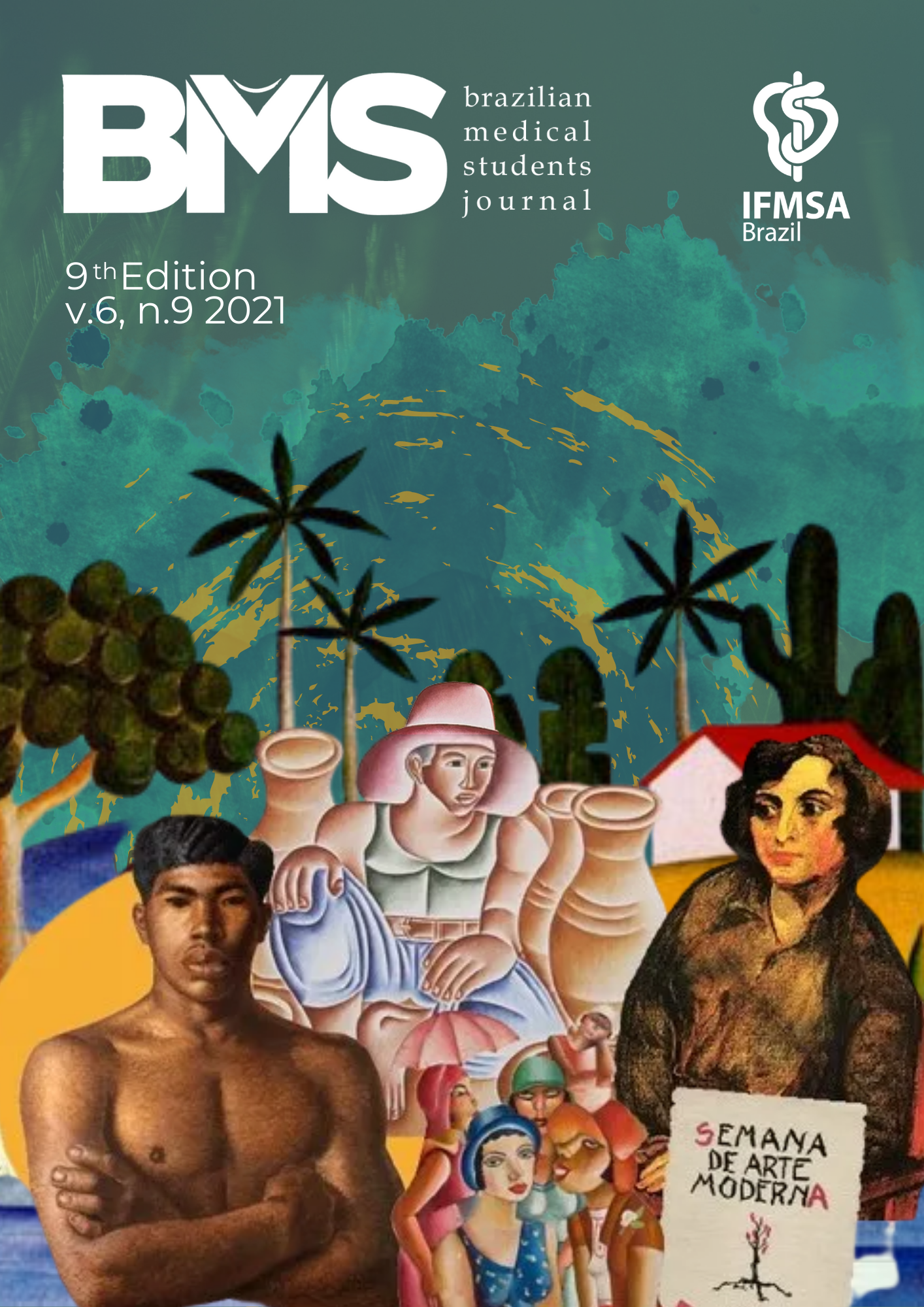THE CREATION OF AN ELECTRONIC RPG GAME AS AN INTEGRATED APPROACH OF HUMAN BODY SYSTEMS: AN EXPERIENCE REPORT
DOI:
https://doi.org/10.53843/bms.v6i9.274Keywords:
Educação Médica, Jogos de Vídeo, Aprendizagem baseada em problemas, Sistemas de Aprendizagem em SaúdeAbstract
Introduction: The traditional education, based on expositive classes in which the teachers are the protagonists and the students are put as passive spectators, is still used by the majority of educational institutions. However, some methods can make students directly responsible for their knowledge and have shown to be effective in encouraging autonomy and reasoning. Furthermore, during the Covid-19 pandemic, there was a need to change the way of teaching, investing in active and attractive methodologies, such as electronic games, to ensure that learning is satisfying.Therefore, the objective of this report is to describe the experience of elaborating an educational game for and to medical students. Experience report: Based on the proposal of an academic work from the medical course, the game "Pâncrea Bit", a storyteller role playing game, was created and it integrated some subjects as diabetes 3C and chronic pancreatitis by a group with 13 participants which divided the functions. In addition, an educational material was produced with the topics covered in the game and complementary image animations. Discussion: Although there is no scientific proof of the efficiency of the educational method utilizing games in comparison to the traditional when analyzing the professionals quality, it is already known that this kind of teaching gives more satisfaction to the students.This was demonstrated by the massive participation of other students in conducting and solving the “Pâncrea Bit” quizzes. Conclusion: The gamification aroused interest, motivation and introduced the student as protagonist besides contributing to long-term memory, showing that is a valid and applicable method to concretize knowledge in every learning stage.
Metrics
References
Xue H, Yuan H, Li G, Liu J, Zhang X. Comparison of team-based learning vs. lecture-based teaching with small group discussion in a master‘s degree in nursing education course. Nurse Education Today. 2021;105:105043. DOI: https://doi.org/10.1016/j.nedt.2021.105043
Ulfa Y, Igarashi Y, Takahata K, Shishido E, Horiuchi S. A comparison of team-based learning and lecture-based learning on clinical reasoning and classroom engagement: a cluster randomized controlled trial. BMC Med Educ. 2021;21:444. DOI: https://doi.org/10.1186/s12909-021-02881-8
Almanar MA. The shifting of face to face learning to distance learning during the pandemic Covid-19. Globish: An English-Indonesian Journal for English, Education, and Culture. 2020;9(2):1-8. DOI: https://doi.org/10.31000/globish.v9i2.2772
Lozza R, Rinaldi, GP. O uso dos jogos para a aprendizagem no ensino superior. Caderno PAIC, 2017;18(1):575-592.
Kapp KM. The gamification of learning and instruction: game‐based methods and strategies for training and education. John Wiley & Sons, 2012. DOI: https://doi.org/10.1145/2207270.2211316
Kane L. Educators, learners and active learning methodologies. International Journal of Life long Education. 2004;23(3):275-286. DOI: https://doi.org/10.1080/0260/37042000229237
Morris ME, Kuehn KS, Brown J, Nurius PS, Zhang H, Sefidgar YS, et al. College from home during COVID-19: A mixed-methods study of heterogeneous experiences. PLoS One. 2021;16(6):e0251580. DOI: https://doi.org/10.1371/journal.pone.0251580
Huber J, Witti M, Schunk M, Fischer MR, Tolks D. The use of the online Inverted Classroom Model for digital teaching with gamification in medical studies. GMS journal for medical education. 2021;38(1):Doc3.
de Souza Vieira A, Saibert AP, Neto MJR, da Costa TM, de Souza Paiva NJRBES. O estado da arte das práticas de gamificação no processo de ensino e aprendizagem no ensino superior. 2018;4(1):5-23. DOI: https://doi.org/10.18256/2447-3944.2018.v4i1.2185
Ahmed M, Sherwani Y, Al-Jibury O, Najim M, Rabee R, Ashraf M. Gamification in medical education. Medical education online. 2015;20:29.536. DOI: https://doi.org/10.3402/meo.v20.29536
Singhal S, Hough J, Cripps D. Twelve tips for incorporating gamification into medical education. MedE Publish. 2019;8(3). DOI: https://doi.org/10.15694/mep.2019.000216.1
Gorbanev I, Agudelo-Londoño S, González RA, et al. A systematic review of serious games in medical education: quality of evidence and pedagogical strategy. Med Educ Online. 2018;23(1):1438718. DOI: https://doi.org/10.1080/10872981.2018.1438718
Augustin M. Como aprender com eficácia na faculdade de medicina: teste-se, aprenda ativamente e repita em intervalos. Yale J Biol Med. 2014; 87(2): 207-12.
Gauthier A, Corrin M, Jenkinson J. Exploring the influence of game design on learning and voluntary use in an online vascular anatomy study aid. Computer & Education. 2015,87:24-34. DOI: https://doi.org/10.1016/j.compedu.2015.03.017
Gentry SV, Gauthier A, L'Estrade Ehrstrom B, et al. Serious Gaming and Gamification Education in Health Professions: Systematic Review. J Med Internet Res. 2019;21(3):e12994. DOI: https://doi.org/10.2196/12994
Charczuk SB. Sustentar a Transferência no Ensino Remoto: docência em tempos de pandemia. Educação & Realidade. 2020;45(4):e109-145 DOI: https://doi.org/10.1590/2175-6236109145
Downloads
Published
How to Cite
Issue
Section
License
Copyright (c) 2022 Ernandes Felipe da Silva Oliveira, Matheus Lemes Gondin de Oliveira, Beatriz Arruda de Almeida, Rafael Cabral de Carli , Rafael Monteiro Pereira de Farias , Raquel Marinho Carlos , Letícia Lima Freitas, Alberto Henrique Torres Trindade Da Silva , Ana Vitória Hirt Ribeiro, Maíra Espíndola Torres , Thamires da Silva Sampaio Medrado, Júlia Feitosa Brito dos Santos , Victória Bedor Jardim Quirino

This work is licensed under a Creative Commons Attribution 4.0 International License.
User licenses define how readers and the general public can use the article without needing other permissions. The Creative Commons public licenses provide a standard set of terms and conditions that creators and other rights holders can use to share original works of authorship and other material subjects to copyright and certain other rights specified in the public license available at https:// creativecommons.org/licenses/by/4.0/deed.pt_BR. Using the 4.0 International Public License, Brazilian Medical Students (BMS) grants the public permission to use published material under specified terms and conditions agreed to by the journal. By exercising the licensed rights, authors accept and agree to abide by the terms and conditions of the Creative Commons Attribution 4.0 International Public License.






